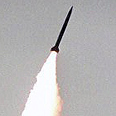
'Extremely complex.' S-300 (archives)
Photo: AFP
Iran has developed a version of the Russian S-300 missile and will test-fire it soon, the official news agency IRNA said, two months after Moscow cancelled a delivery of the sophisticated system to Tehran to comply with UN sanctions.
"The Iranian (version) of the S-300 system is undergoing field modification and will be test-fired soon," IRNA quoted Brigadier General Mohammad Hassan Mansourian, a commander in Iran's elite Revolutionary Guards, on Wednesday as saying.
Military Option
Former US president reveals in his memoirs that military option was defined as 'my last resort.' And why did his mother refer to him as 'first Jewish president'?
World powers are locked in an eight-year-old stand-off with Iran over its nuclear energy program, which they believe will be used to develop nuclear bombs rather than be devoted to peaceful generation of electricity, as Tehran says.
Some Western officials suspect Iran's development of more sophisticated missiles and some much-publicized missile tests could serve the goal of developing a deliverable nuclear weapon.
The Islamic Republic denies such accusations, saying its missile development efforts are for defensive purposes only.
Russian President Dmitry Medvedev banned the delivery of the high-precision S-300 air defense system to Iran in September, scuttling a tentative deal in gestation for years, saying it would violate expanded UN sanctions imposed in June over Iran's defiance of demands to curb its nuclear program.
Iranian officials said after Russia scrapped the sale that Tehran had decided to build its own model of the S-300.
Tougher stance
"Buying S-300 missiles from the Russia was on the agenda to meet some of the security needs of our country," said Mansourian. "But under the pretext of the (UN Security Council) resolution and due to American and Zionist pressure, Russia refused to deliver the defensive system."
Pieter Wezeman, a researcher on military issues at the Stockholm International Peace Research Institute (SIPRI), said he was skeptical about Iran's ability to build its own S-300.
"Producing such a system is an extremely complex thing to do. These are advanced systems which only have been produced by countries with a very extensive, well-functioning arms industry with a large industrial base," Wezeman told Reuters.
The United States and Israel had urged Moscow to scrap the deal, fearing Iran could use S-300s to shield nuclear facilities that they suspect are part of an atomic bomb program.
US and Israeli officials have not ruled out a pre-emptive attack to knock out Iran's nuclear sites if diplomacy fails.
Iran this week offered world powers some dates for renewed talks but President Mahmoud Ahmadinejad said on Thursday the disputed nuclear program would not be up for negotiation.
The Islamic Republic has warned that its response to any military attack would be crushing.
Iranian officials have criticized their Russian counterparts for unilaterally nullifying the S-300 sale contract.
A Russian official has said Moscow planned to pay back a $166.8 million advance payment made by Iran for the S-300.
Moscow's support for a fourth round of UN sanctions was part of a gradual shift closer towards the tougher stance that the United States and European Union have taken towards Iran.
Russia, which has built Iran's first civilian atomic power plant, backs Western efforts to make Iran prove its nuclear work is purely peaceful, but strongly opposes any use of force.
- Follow Ynetnews on Facebook















